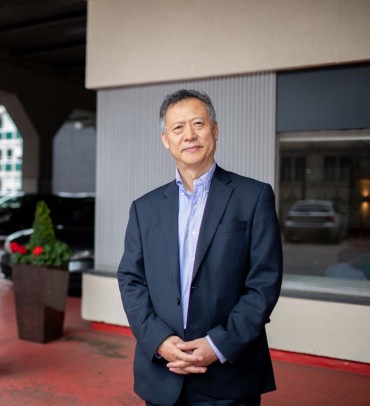Author: WANG Hui |
How to deal with climate change, how to mitigate or even reverse it, maybe the hottest scientific topic of the 21st century. Do you know that a Chinese scientist and his team contributed to climate change control by reducing PM2.5 in diesel car exhaust by 35–40%? That scientist is Prof. Lin Li, a Fellow of the Royal Academy of Engineering and founder of the Laser Processing Research Centre at The University of Manchester, United Kingdom. Of course, this is only one example of Professor Li’s scientific achievements. As a pioneer of microsphere super-resolution lens, his team, in collaboration with Singapore colleagues, broke the optical diffraction limit in optical microscopic imaging, making real-time observation of biological viruses without interference possible. He also used lasers to synthesize new nanomaterials which kill drug-resistant bacteria while remaining harmless to healthy human cells, which led to the development and breakthrough of related research fields. We are much honored to have Professor Lin Li for an exclusive interview in which he recalls his years of scientific research experience and talks about the future development trend of laser material processing.

Bibliography: Professor Lin Li is Director of Laser Processing Research Centre at The University of Manchester, UK. He served as President of Laser Institute of America (2016), President of International Academy of Photonics and Laser Engineering (2013–2015), and President of Association of Industrial Laser Users (AILU–2017–2019).
He is an elected Fellow of Royal Academy of Engineering (FREng), Fellow of Laser Institute of America (LIA), Fellow of International Academy of Production Engineering (CIRP), Fellow of International Academy of Photonics and Laser Engineering (IAPLE), and Fellow of Institute of Engineering and Technology (IET). He is an author and co-author of over 400 publications in peer-reviewed journals related to laser-based manufacturing and an inventor or co-inventor of more than 60 patents. He received Sir Frank Whittle Medal from the Royal Academy of Engineering in 2013 for innovative manufacturing that has generated significant economic impacts. In 2014 he received Wolfson Research Merit Award from the Royal Society for his research on laser nano-fabrication and nano-imaging and received the Researcher of the Year medal from The University of Manchester in 2014. He received the Arthur Schawlow award from Laser Institute of America in 2019 for distinguished achievements in laser-based manufacturing, and the Donald Julius Groen Prize, and the Arthur Charles Main Award from the Institution of Mechanical Engineers for leadership in additive manufacturing.
He obtained a BSc degree in Control Engineering from Dalian University of Technology (China) in 1982 and a Ph.D. degree in Laser Engineering from Imperial College London in 1989. He worked at The University of Liverpool (UK) between 1988 and 1994 as a Research Associate and Research Fellow in laser material processing and became a Lecturer in Manufacturing at The University of Manchester Institute of Science and Technology (UMIST), UK, and was promoted to a Full Professor in Laser Engineering in 2000. He served as the Deputy Head of School of Mechanical, Aerospace and Civil Engineering at The University of Manchester during 2009–2013 and served as the Associate Dean of Faculty of Science and Engineering at The University of Manchester during 2015–2020.
Link to article: https://www.nature.com/articles/s41377-021-00566-x
